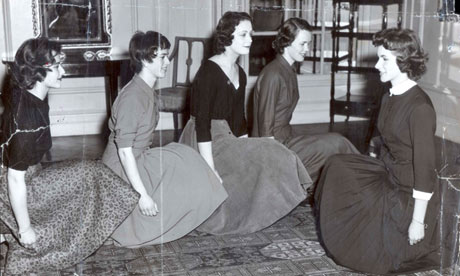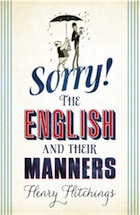Henry Hitchings's study of English etiquette is a bold and entertaining take on an impossible subject

Susan Hampshire, right, demonstates how to
curtsey before the queen, 1956. Photograph: Alamy
Henry Hitchings, the
Evening Standard's theatre critic, has been suffering from a mild case
of anglophilia for some years. The first symptoms appeared with his study of Dr
Johnson's dictionary, followed by two well-received books on the by-ways of
the English language (The
Secret Life of Words and The
Language Wars). Now, he has succumbed to a full-blown case of
anglomania, a study of English social behaviour through the ages whose title –
Sorry! – suggests that he knows his affliction is both contagious and
untreatable.Any treatment, indeed,
might be more dangerous than the cure. Hitchings's subtitle, "The English and
Their Manners", indicates that he has also contracted a virulent side-effect,
the agonies of the "British" question. The catalogue of commentarians who have
been driven to the edge of insanity by this topic is long and distinguished.
George Orwell, no less, grappled with it in his 1941 essay "The
Lion and the Unicorn". Orwell noted that "we call our islands by no less
than six different names", concluding with a celebration of "muddle". Hitchings,
defining the territory of his investigation as best he can, acknowledges this
historical difficulty, but declares that "English" rather than "British" manners
acknowledge "something visceral".
Intestines, however, are also slippery. Some years ago, the Times
sponsored a campaign for a British motto to rival France's Liberté, égalité,
fraternité. All hell broke loose. Readers' suggestions included "Dipso,
fatso, bingo, asbo, Tesco", closely followed by "No motto please, we're
British". With this subject, a raised eyebrow can be as meaningful as a national
mission statement. The English have never ceased to find themselves, and the complexities of
their island inheritance, fascinating. The question of "Englishness" has been a
literary genre at least since Daniel Defoe made his tour of Great Britain in
1724-27. The best parts of Sorry! are when Hitchings re-examines the
English "manners" of, for example, Samuel Pepys, Lord Chesterfield, who invented
"etiquette", Edmund Burke, or Fanny Trollope (Anthony's mother) and her
entertaining strictures about the vulgarity and self-belief of Americans.
The English have never ceased to find themselves, and the complexities of
their island inheritance, fascinating. The question of "Englishness" has been a
literary genre at least since Daniel Defoe made his tour of Great Britain in
1724-27. The best parts of Sorry! are when Hitchings re-examines the
English "manners" of, for example, Samuel Pepys, Lord Chesterfield, who invented
"etiquette", Edmund Burke, or Fanny Trollope (Anthony's mother) and her
entertaining strictures about the vulgarity and self-belief of Americans.The past is another country. As his exposition of English manners, and why we behave the way we do, approaches the present day, the rigour of Hitchings's absorbing analysis starts to break down as he becomes distracted by myriad contemporary issues and concerns, ranging from telephone etiquette (mobiles at the dinner table?), to supermarket manners (ogling a neighbour's shopping trolley). Hitchings the journalist moves his centre of gravity from the library to the field. His research becomes impressionistic and personal (a cafe in the West Midlands; a restaurant in Egypt; childhood memories from the 1970s and 80s; vox pops with young people). Hunting a moving target becomes a game of pin the tail on the donkey.
The paradox of English life
is that ours is a small-c conservative, broadly democratic society founded on chaos,
privilege and snobbery. Our political class emerged from the mother of all
invasions by a foreign power. Our national church was created by a royal divorce
case. Our famous monarchy derives from regicide and civil war. As an insular
society, Britain's public face is often provincial, though its history is uniquely global.
The English, in other words, are a complicated people whose "manners" can be
simultaneously coarse and sophisticated, both staggeringly rude as well as
astoundingly polite. Everything one says about them is true – and so is its
opposite. Reconciling a long history of disruptive, sometimes thrilling, social
expression with a scholarly appetite for themes will always be problematic for
the historian. Hitchings has made a bold, entertaining, and often imaginative,
assault on a fundamentally impossible subject. Perhaps in writing
Sorry! he will have found a cure for his affliction.

No comments:
Post a Comment